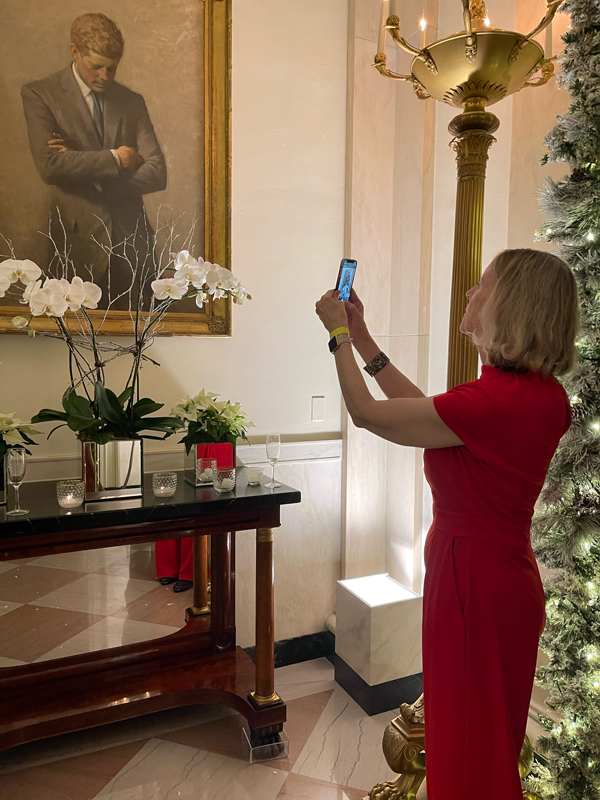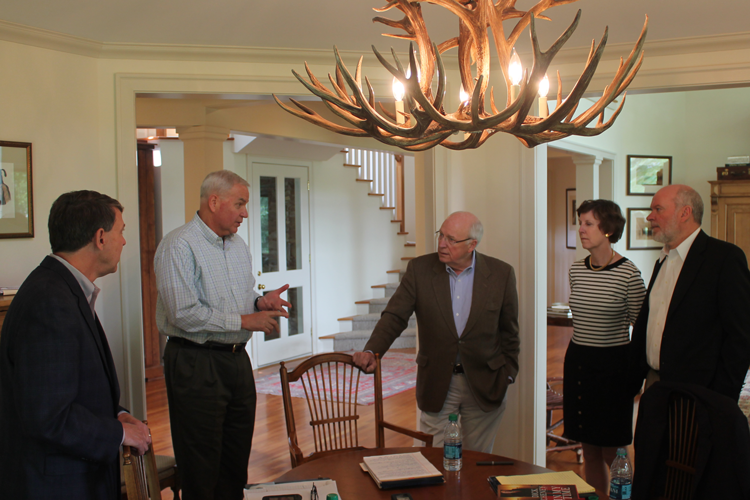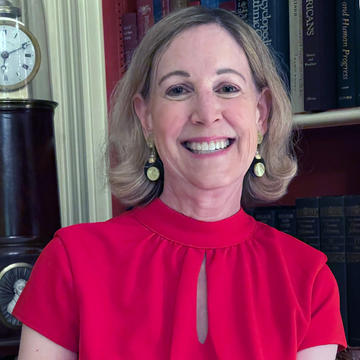Devoted to the presidency
Barbara Perry's scrupulously balanced approach
Barbara Perry’s earliest presidential memory was formed when she was just four years old, on an October day in 1960 when her mother took her to hear John F. Kennedy’s campaign speech in downtown Louisville, Kentucky.
Perry’s most recent presidential memory happened in December, when she chatted with President Joe Biden at a White House holiday reception.
In between, Perry has spent a lifetime interviewing presidents, writing about presidents, leading presidential oral histories, and mingling with presidential families. Along the way, she scaled a fence to watch Ethel Kennedy play tennis at the Hickory Hill Kennedy family compound in McLean, Virginia, chatted for hours with Vice President Dick Cheney in his dining room in Wyoming, and followed presidential candidate Mo Udall around a potato festival in Kentucky.
Not bad for a self-described “introverted scholar” who dreamed in high school of becoming America’s first woman president—although she eventually changed her mind about seeking elective office during a Capitol Hill internship, when she was shocked to discover the existence of signature machines. “As a college student, I’d get these letters from my congressman and senators offering congratulations on making the dean’s list,” Perry recalled. “Then I realized they weren’t actually writing those letters. I was put off by the fakery of politics.” For the past nine years, Perry has served as the Miller Center’s director of Presidential Studies while leading the Center’s esteemed Presidential Oral History Program along with co-director Russell Riley and overseeing theCenter’s other signature presidential projects, including the Presidential Recordings Program and the comprehensive presidential biographical materials on millercenter.org.
She has conducted more than 130 in-depth interviews for the George H. W. Bush, George W. Bush, Bill Clinton, Barack Obama, and Sen. Edward Kennedy oral history projects, and she is currently co-directing a Hillary Clinton project while laying the groundwork for one planned on the Donald Trump administration.
The author or co-author of five books about modern presidents and the Miller Center’s Gerald L. Baliles Professor, Perry serves on the boards of the White House Historical Association and the John F. Kennedy Library Foundation.

Yet Perry’s wide-ranging interests don’t stop with the presidency. She’s also a nationally recognized expert on the Supreme Court, having served as a fellow for the high court and authored six books about it. She counted Justices Antonin Scalia, Sandra Day O’Connor, William Brennan, and Chief Justice William Rehnquist as acquaintances.
“I’m just drawn to understand famous people,” Perry explained. “I don’t know why. Maybe because my mother was so excited about famous people.”
Perry credits her “ordinary” parents with inspiring her extraordinary interests and curiosity. Although the Great Depression blocked their dreams of going to college, her father, Louis—who worked as a photoengraver for the Louisville Courier Journal, and her mother, Lillian—a homemaker— instilled in her a keen sense of civic responsibility.
From an early age, Perry recalled, her mother would take her and her two older brothers to political rallies and into the voting booth on Election Day. Every night after finishing his shift, Perry’s father would bring home defective copies of the day’s newspapers that failed quality-control checks, seeding Perry’s daily-newspaper habit. Her dad, a World War II Army veteran, took her to see former President Dwight Eisenhower as he campaigned in the 1962 midterm elections. And the whole family drove to Hodgenville, Kentucky, the birthplace of Abraham Lincoln.
Her parents were particularly proud, Perry said, to have scraped together the money to buy a full set of the World Book Encyclopedia—“plus every Year Book supplement up to 1978.” And they subscribed to all the major magazines of the era, which Perry devoured.
Perry’s mother also set her on a path to overcome her natural shyness, encouraging her to enter a second-grade speech contest on “Why I like the library” and helping her practice by using the crooked handle of a vacuum cleaner as a pretend microphone. She won—the first of many academic accolades that would culminate in a perfect 4.0 GPA earned at the University of Louisville; a scholarship to the University of Oxford, where she earned a master of arts degree; and a PhD in American government from the University of Virginia.
Perry has a particular fascination with President John F. Kennedy and the Kennedy family, which has led her to write books about JFK, Jacqueline Kennedy, Rose Kennedy, and Sen. Edward Kennedy. As a leading authority on the star-crossed family, she is often sought to write and speak about the Kennedys and has served as an on-camera expert in numerous documentaries. She’s been invited to speak to the British Parliament about JFK in June.
But never mistake Perry for some blind partisan. Beyond her work on the Bush 41 and Bush 43 oral history projects, during which she gained the trust of scores of senior Republican interview subjects, Perry is a nonresident fellow at the Mitch McConnell Center at the University of Louisville. She counts among her favorite oral histories the 25 hours she spent interviewing Dick Cheney at his home in Jackson Hole, Wyoming.

“When I am conducting an oral history, I take off any ideological hat that I might wear in a private setting,” Perry said. “I see these people as people first, not partisans. I go into it with that approach, which is very easy for me to do, because I’m really interested in people’s personalities and their backgrounds.”
To illustrate the value of the Miller Center’s rigorously nonpartisan approach to presidential research, Perry cites two contemporaneous oral history interviews she helped lead: Marc Short, former director of legislative affairs for President Donald Trump, and Melody Barnes, former director of domestic policy for President Barack Obama.
“One is a white man from the Norfolk area; one is a Black woman from Richmond,” Perry explained. “Two people with very different family backgrounds who ended up in different spots on the political spectrum, working for very different office holders.
“So we have two really good interviews with these two different people from these two different parts of the spectrum, and yet growing up in the same Commonwealth of Virginia about the same time. Why did one become a liberal and one become a conservative? Why did they work for the people they did?”
The Short interview was part of preliminary research for a planned Trump oral history project, and the Barnes interview was part of the ongoing Obama oral history project. Neither will be publicly released until the full projects are concluded in future years.
Yet someday, Perry predicted, “if people only read those two interviews, I think they’d have a really good understanding of politics in the United States in this perplexing time.”
